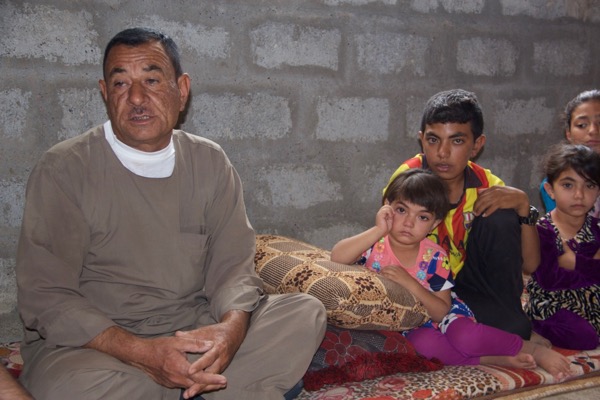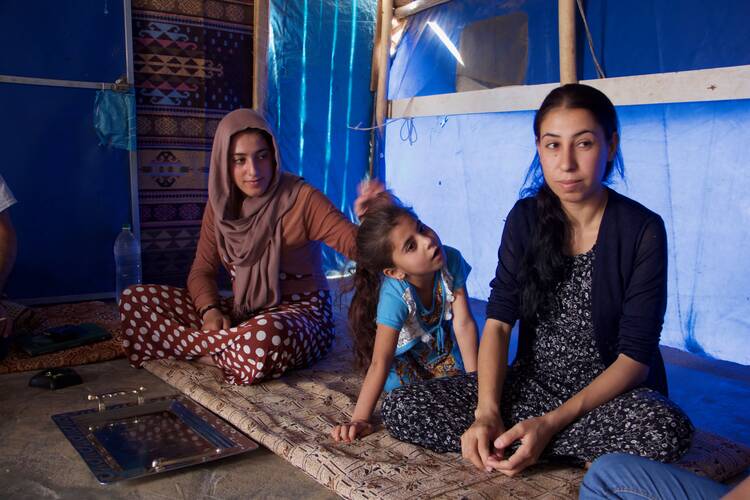At Sharya camp, near Duhok in northern Iraq, Yazidi survivors plot the return of as many as 3,000 loved ones who are still held captive and seek answers on the fate of nearly 7,000 others who are missing. Among the survivors here is Layla Taalo, a young mother of two who has lived in Sharya since 2017, when she was recovered from Raqqa, Syria, where she was enslaved by ISIS.
On Aug. 3, 2014, she and her husband and their children were captured along with most of Layla’s extended family as they tried to escape to the Sinjar mountains. She does not know what happened to her husband, but she was sold into slavery with her children. Over the course of nearly three years, Layla was traded nine times among ISIS fighters and their supporters before her brother was able to ransom her and her children. Now Layla and the other survivors in her family, including two nieces who had also been traded as slaves, live together in this tent compound.
Five years ago in August 2014, ISIS extremists launched a genocidal campaign across Iraq’s Sinjar and Nineveh regions that would come to horrify the world. Thousands of Yazidi and Christian families were put to flight; those too slow, too old or too unlucky to escape the onslaught were captured. Many were killed; many more, especially Yazidi women with their children, were sold into slavery.
An Iraqi-U.S. coalition counter-offensive eventually drove ISIS from Sinjar in 2015 and Nineveh in 2017. Since then, thousands of Christian families have been able to return to communities as they are being rebuilt. Sinjar was pummeled by the extremists and then by the air and land campaign that drove them out, but little has been done to restore the region to its pre-ISIS condition. The Christian restoration in Nineveh is far from certain, but more than 300,000 Yazidis are still living in emergency camps under conditions little changed from their first weeks of exile.
Five years ago in August 2014, ISIS extremists launched a genocidal campaign across Iraq’s Sinjar and Nineveh regions. Thousands of Yazidi and Christian families were put to flight.
Here in Sharya, Khalid Taalo, Layla’s older brother, has struggled for years to piece his family back together, looking for information about the missing and raising money to free its captives. It is not true what the world thinks, he insisted, that honor killings would result if Yazidi women were returned from ISIS to their families because of what happened to them.
“It is not true that we would abandon them because they had been shamed by their treatment under ISIS. The shame is on ISIS,” Khalid said, not on the Yazidi women, not on his sister or his nieces. “We would do anything to get them back safe and alive,” Khalid said in October, during a visit to the Taalo “home,” a series of connected tents and U.N. emergency shelters. He already has gone to extraordinary lengths to recover his family. Many other Yazidi families have done the same.
Among extended family who now live as refugees in Europe and from online donations, Khalid raised and spent almost $100,000 to secure the release of 10 of his female relatives who had been swept up by ISIS. The nine male relatives who also went missing during that awful week, he does not look for, he said. He does not negotiate with shadowy human traffickers and criminals as he has done to free the women who were taken. He presumes the male relatives, from the youngest boys to the oldest men, are all long dead.
They are buried out there someplace in Sinjar. The United Nations believes 5,000 Yazidi men and boys were executed in the immediate aftermath of the ISIS attack. As more unmarked mass graves are discovered, he may someday be able to bring some of the Taalo men and boys taken by ISIS back home. That presumes he and his surviving family members are ever able to leave this camp and return to Sinjar.
Not far from Sharya, where most Yazidis still live in tents and other makeshift shelters, Christian villages are being rebuilt and some Christian families, those who dare, have been restored to their homes and communities in Nineveh. But the Yazidi people are a small ethnic and religious minority. Their global network is small, their resources limited and the political influence they wield negligible.
“It is not true that we would abandon them because they had been shamed. The shame is on ISIS,” Khalid said, not on the Yazidi women, not on his sister or his nieces. “We would do anything to get them back safe and alive.”
Now Turkey and Iran, Kurdistan and Iraq vie for control of Sinjar. The militias and other armed groups supported by these various regional players may be preparing for another military confrontation there. The Yazidis at Sharya camp believe they would not be safe from more violence if they returned home, even if they could. No one is rushing to clear out ISIS booby traps and weapons caches from devastated Yazidi towns. No one is making sure that ISIS dead-enders or sleeper cells are not ready to strike in Sinjar again or that Shia-backed militia might also evolve into a threat to Yazidis.
“Look at my sister. After two years living with them, she has suffered enough. She does not deserve to live like this,” Khalid said, opening up his arms to gesture at the tarp walls and carpet dividers the family has thrown together into a home here.
But the world is not funneling cash into Sinjar to rebuild Yazidi homes and villages. The Yazidis sit and wait in these camps, as Khalid and his extended family do, pleading their case before passing journalists and aid workers.
“There is no hope, no future here,” Khalid said, but he would not return to Sinjar and subject Layla and the rest of his family to the threat of kidnapping or worse again. Perhaps if the militias were gone and there were international forces on the ground in Sinjar, he speculated. Maybe then the family would return.
Jesuit Refugee Service has been assisting the residents at Sharya, offering trauma and educational services and helping reintegrate family members as they are returned. Staff here share their frustration with how little attention the plight of Yazidis has received, how trapped many Yazidi feel in a camp they had first perceived as a life-saving refuge.
Now suicide and suicidal ideation, born out of boredom and despair or untreated psychological trauma, have become a plague among even the young. During this fifth anniversary of the ISIS attempted genocide in Sinjar, J.R.S. has launched a media campaign—#DoNotForgetUs—in an effort to draw global attention to the ongoing suffering of the Yazidi minority in Iraq.

Along a hillside that marks the outer borders of the camp, Salo Ramo, a middle-aged Yazidi father has created a small compound, including a sturdy cinder block home, a rare sight, with a small pond for scores of ducks that he maintains and brings to market to help support his large family. He and his wife Jamila Qasim Khalaf care for their own four children and the five surviving children of his brother and sister-in-law. “I love them before my own kids,” he said, surveying a row of children, cross-legged on a carpet, wary-eyed and curious before their visitor.
His young nieces and nephews happened to be visiting his family as his brother, Dakhil Ramo Khudeda, and his wife with two daughters, one eight and the other a baby, were on an outing in August 2014 when ISIS came. Mr. Ramo and his wife managed to escape, gathering together all the children from both families.
They were able to keep the kids alive for seven days on the Sinjar mountains without food, water, even shoes, as the dehydrated and heat-exhausted dead gathered around them. “I saw a lot of terrible things; the children did, too,” Mr. Ramo recalled of that dreadful week. “Children crying for food; children crying for water, crying for their parents.” And parents struggling to keep their children alive as ISIS fighters harassed stragglers with small arms and mortar fire as they reached the mountain. “It was a disaster,” he said.
His brother Dakhil, a soldier in the Iraqi army, was seized and immediately executed. His sister-in-law, Qute Shamo Qasim, and the children were trafficked into ISIS slavery. Eventually his sister-in-law was separated from her children.
An ISIS extremist sexually assaulted then murdered his 8-year-old niece, Ahlam, and the baby was sold to another family. Miraculously, they were able to recover this youngest niece after the Iraqi army liberated Mosul and freed Yazidi captives held there. He was able to locate her among a database of recovered Yazidi survivors.
Now he struggles to acclimate the toddler with the family she does not know. She speaks the Arabic she learned from the family that bought her and is slowly learning her family’s Kurdish tongue. Many of the returned Yazidi children had been indoctrinated over their time with ISIS and believe their own people are devil-worshippers and infidels. Some had been trained as child soldiers. Part of the J.R.S. outreach in the camp is assisting with the deprogramming of such children.
He believes his sister-in-law, the mother to more than half the children he is raising, may still be alive out there someplace, a slave to whatever is left of ISIS. At least she was alive a year ago when she was able to find a cell phone and briefly talk with the family. He maintains the faint hope that he may someday be able to reunite her with her surviving children. Until then, he and his wife are prepared to continue to care for them.
The surroundings here are stark. There is a bare minimum of furniture; the children sit on carpets on the floor. But they seem cheerful and clean. They have a refrigerator with cold drinks and cookies to share with a visitor. It is hard to imagine the horrors they have seen. May it be the last they will have to endure.
“All these organizations visit us, but nobody helps us,” Mr. Ramo marvels, “And there is no help from the government, not from the Iraqis or from the Kurds.” It is a familiar refrain in this camp.
He knows his home in Sinjar is gone, burned to the ground. “All we had has been washed away.” Yet “all of us just want to go back to our homeland.”
There is no hope going back now. No safety. Mr. Ramo runs through a litany of armed groups and militias who are vying for control of Sinjar, none of them friendly to Yazidi people. “There is no security there; nothing is safe. It is too dangerous.” He shrugs. “Who will protect us? We cannot believe that the Iraqis or the Peshmerga anymore will protect us or save us.”
The Iraqi army captured and summarily executed the ISIS extremist responsible for killing his little niece after the militant’s wife told Iraqi soldiers what he had done to Mr. Ramo’s niece. The Iraqis sent him a picture of the militant’s corpse after his execution, he told me without elaboration or evident emotion.
“The three oldest children know what happened to their parents,” Mr. Ramo said. “The little ones don’t know,” he added, regarding the squad of children watching us.
“I hope one day their mother can come back.”
Find out how you can help:
Nadia’s Intiative
Yazda | Global Yazidi Organization
Jesuit Refugee Service Middle East and North Africa
Assisting Christian reconstruction in Nineveh:
Aid to the Church in Need
Catholic Near East Welfare Association
Catholic Relief Services/Caritas Iraq
Chaldean Archdiocese of Erbil
Knights of Columbus Christian Refugee Relief
Nineveh Reconstruction Committee










